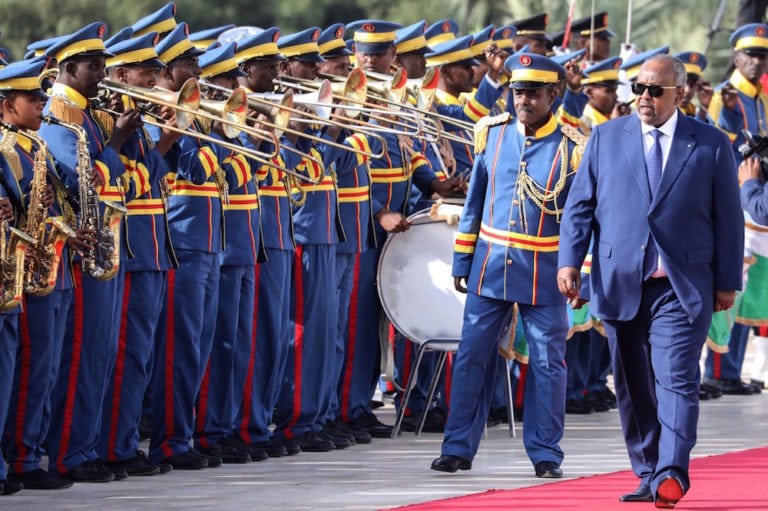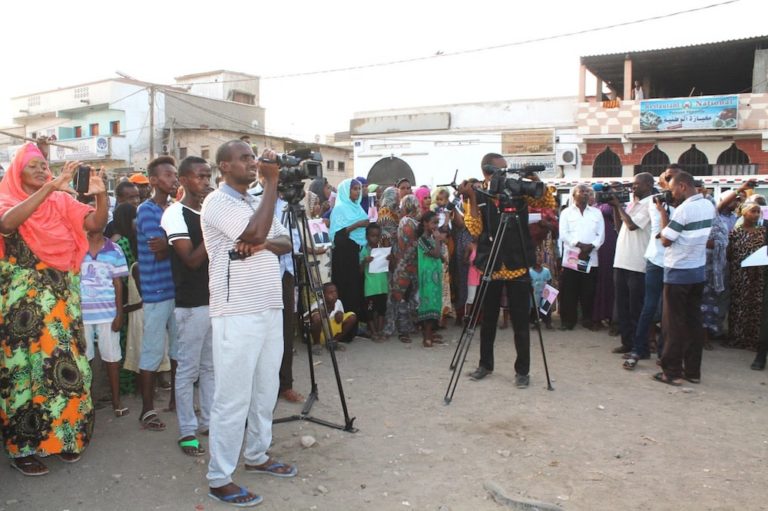(RSF/IFEX) – On 27 June 2007, the 30th anniversary of Djibouti’s independence, Reporters Without Borders condemns the increasingly authoritarian tendencies of President Ismael Omar Guelleh’s government, in particular, a campaign of harassment that led to “Le Renouveau Djiboutien”, the country’s sole opposition newspaper, being silenced. “The national holiday is a time of anxiety this year,” […]
(RSF/IFEX) – On 27 June 2007, the 30th anniversary of Djibouti’s independence, Reporters Without Borders condemns the increasingly authoritarian tendencies of President Ismael Omar Guelleh’s government, in particular, a campaign of harassment that led to “Le Renouveau Djiboutien”, the country’s sole opposition newspaper, being silenced.
“The national holiday is a time of anxiety this year,” the press freedom organisation said. “Little by little, Djibouti is closing itself off to the world and to criticism. It was already worrying to see that, despite limited resources, Djiboutians had only one opposition publication offering a different take on the news. Now that it has been forced to shut down, the government has a monopoly of national news.”
Reporters Without Borders added: “The government’s growing authoritarianism must not continue unpunished, with France and the United States, which both have a military presence in Djibouti, looking on without saying anything. The national holiday should have been the occasion for the authorities to finally open up the broadcast and print media, guarantee press freedom and allow Radio France Internationale to resume broadcasting.”
A weekly that is the mouthpiece of the opposition Movement for Democratic Renewal and Development (MRD), “Le Renouveau Djiboutien” has not been able to publish since 13 May, after its print material was confiscated by the police for the third time in four months. As a result, Djibouti is now one of the few African countries, along with Eritrea and Equatorial Guinea, where no private newspapers are published.
Its managing editor, Daher Ahmed Farah, has been in the regime’s sights for the past 10 years. He was arrested four times in 2003, spending nearly three months in prison. He is currently based abroad. His brother, Houssein Ahmed Farah, was held for nine days in June 2004 for allegedly “threatening the First Lady’s life” – a reference to the fact that, while covering a street protest from his car, he had to break sharply to avoid her passing motorcade.
Several members of the weekly’s staff and MRD activists have been arrested – for the most part briefly – since harassment resumed in February of this year. Farah Abadid Hildid, an MRD member and employee of “Le Renouveau Djiboutien”, is still in prison after being arrested on 3 June and being given a one-month sentence on 14 June for publishing inaccurate information. Farah, the editor’s brother, has been arrested twice in the past five months, from 7 to 10 February and from 6 to 13 May. The newspaper’s street vendors were also regularly harassed and arrested.
Citing judicial investigations into alleged libel or publication of inaccurate information, the police have carried out raids on the premises of the party and the newspaper, and Daher Ahmed Farah’s home. A computer used to edit the newspaper was seized on 7 February, sabotaging the next few issues.
Print material was seized on 29 March, again preventing the weekly from being published. The police raided the MRD’s headquarters in the Hayableh district on 13 May, seizing sound equipment used for demonstrations and newly-acquired print material. “Le Renouveau Djiboutien”‘s staff tried unsuccessfully to bring out an issue on 17 May. There has been no attempt since then.
It was the last publication not under government control. The only newspapers still being published in Djibouti are the governmental biweekly “La Nation” and the Arabic-language “Al Qaran”, the mouthpiece of the ruling Popular Rally for Progress (RPP), which appears irregularly. The British and US public radio stations, the BBC and Voice of America (VOA), are available on the FM wave band. But Radio France Internationale’s FM transmitter was shut down on 14 January 2005 after broadcasting reports about the 1995 murder of French judge Bernard Borrel in Djibouti. The possession of satellite dishes is allowed but is closely monitored by the authorities.


